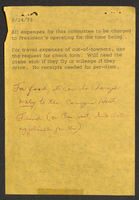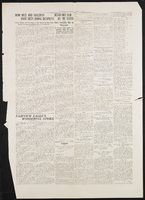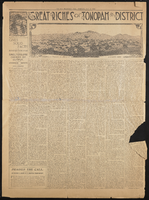Search the Special Collections and Archives Portal
Search Results

Krystal Ramirez oral history interview: transcript
Date
Archival Collection
Description
Oral history interview with Krystal Ramirez conducted by Monserrath Hernández and Barbara Tabach on October 30, 2019 for the Latinx Voices of Southern Nevada Oral History Project. Krystal talks about her personal history growing up in Texas and spending summers with her family in Mexico. She shares her thoughts about how Las Vegas has changed and how she has contributed to the city's art scene as a staff photographer for Vegas Seven (a local magazine), the New York Times, and the Marjorie Barrick Museum. Subjects discussed include: Texas; Chihuahua, Mexico; Latinx Identity; Vegas Seven; Beat Coffee House; Downtown Las Vegas.
Text

Fernando Romero oral history interview: transcript
Date
Archival Collection
Description
Oral history interview with Fernando Romero conducted by Laurents Bañuelos-Benitez on October 2, 2018 for the Latinx Voices of Southern Nevada Oral History Project. Barbara Tabach also participates in the questioning. Fernando Romero was born in El Paso, Texas in a musical home. His father and brother were avid music players, and his brother left El Paso to play in orchestra in Las Vegas. Despite not being as passionate about music as the rest of his family, music was Romero's ticket to higher education. Romero attended University of Nevada South before it was renamed University of Nevada Las Vegas. Romero has gone on to be deeply involved in the Las Vegas community. He is the current president of Hispanics in Politics. Subjects discussed in this interview include: Hispanics in Politics, Nevada Association of Latin Americans, and education.
Text

University of Nevada, Las Vegas law school planning: correspondence, meeting minutes, and clippings
Date
Archival Collection
Description
Folder contains materials related to establishing a law school at UNLV, including: lists of members on the Law School Advisory Board and Citizens Committee for Law School; draft booklet by the UNLV Pre-Law Advisory Committee; The National Pre-Law Newsletter, December 1974; Law School Admission Bulletin, 1974-1975; LSAT/LSDAS blank registration form; Law School Advisory Board meeting minutes, 1973-1974; Consolidated Students of UNLV resolution supporting the establishment of a law school, 1974; correspondence; published articles; and informational documents. From the University of Nevada, Las Vegas William S. Boyd School of Law Records (UA-00048).
Text

Anita Tijerina Revilla oral history interview: transcript
Date
Archival Collection
Description
Oral history interview with Anita Tijerina Revilla conducted by Marcela Rodriguez-Campo on October 09, 2018 for the Latinx Voices of Southern Nevada Oral History Project. In this interview, Revilla discusses her early life in San Antonio, Texas. She talks about her decision to make education a priority, figuring out the college application process on her own, and her initial interest in social justice. Revilla talks about how her critical consciousness was developed, and her pedagogical approach to teaching. Revilla describes her role in the 2006 May Day march, advocating advocating for the queer community, and disrupting oppressive systems to increase educational access for students. Lastly, Revilla discusses ethnic studies and the history of inequality in the United States.
Text

Rocio Rodríguez-Martinez oral history interview: transcript
Date
Archival Collection
Description
Oral history interview with Rocio Rodríguez-Martinez conducted by Elsa Lopez and Monserrath Hernández on June 21, 2019 for the Latinx Voices of Southern Nevada Oral History Project. Rocio shares her personal history growing up in Bogotá, Colombia and how she immigrated to the United States. She talks about motherhood, her Latina identity, and her experiences raising her daughter in Los Angeles and Las Vegas with her husband. Rocio also discusses her employment history and how she was able to achieve her professional goals of becoming a Spanish and English teacher for the Clark County School District (CCSD)'s Family and Community Engagement Services (FACES) program. Her interview is conducted in Spanish. Subjects discussed include: Bogotá, Colombia; El Salvador; Family and Community Engagement Services (FACES).
Text

Emilia Marquez oral history interview: transcript
Date
Archival Collection
Description
Oral history interview with Emilia Marquez conducted by Maribel Estrada Calderón on July 5, 2019 for the Latinx Voices of Southern Nevada Oral History Project. Claytee D. White and Emily Lucile are also present during the interview. Emilia Marquez was born in the United Stated and raised in Alexandria, Virginia, where her father worked as a bricklayer, until the age of twelve, when her father decided to move the family back to Uruguay. She describes acclimating to her new life in middle school and her shift from being perceived as an outsider in Uruguay to accepting Uruguay as home. She describes life in Uruguay and the positions that her family held while living there. After meeting and marrying her husband they trained to work in a casino. She trained as a slot machine operator, and her husband trained as a dealer. This eventually led them to leave Uruguay for the U.S. After the encouragement of her father and mother, she moved with her mother to Las Vegas to work in the casino industry. She describes working as a change person at the Luxor before moving to the newly opened Palms, where she worked until she left it to work at the Wynn. She ends the interview talking about various Uruguayan dishes and traditions, and a brief history of Uruguay. Subjects discussed in this interview: Uruguay, immigration, Las Vegas Strip, Latinx, Luxor.
Text

Margarita Rebollal oral history interview: transcript
Date
Archival Collection
Description
Oral history interview with Margarita Rebollal conducted by Marcela Rodriguez-Campo and Barbara Tabach on February 28, 2019 for the Latinx Voices of Southern Nevada Oral History Project. Margarita Rebollal is a lifelong community organizer and advocate for Latinx civic engagement and rights. She shares what it was like to grow up in Ponce, Puerto Rico and shares her childhood memories growing up on the island with her siblings. Rebollal also discusses the death of her father and the eventual move of her family to New York City, New York. She also recalls her education and teen years. Later, she would move to California, and eventually find her way to Las Vegas, Nevada in 1996. Rebollal discusses her passion for civic engagement and the many years serving the community, being most well-known for her role in founding the Puerto Rican Association of Las Vegas and the Hispanic International Day Parade of Nevada. Rebollal also discusses her campaign for the Ward 1 Las Vegas City Council seat.
Text

June Monroe and Kazuko Atomura oral history interview: transcripts
Date
Archival Collection
Description
Oral history interviews with June Monroe and Kazuko Atomura conducted by Cecilia Winchell and Stefani Evans on July 14 and July 19, 2022 for Reflections: the Las Vegas Asian American and Pacific Islander Oral History Project. In the first interview, Kazuko Atomura describes her childhood in Taiwan and Tokyo, Japan, and shares both happy and difficult mememories of that time. Atomura eventually moved to Los Angeles, California, where she reconnected with a man she previously met in Japan. She married him and together had their daughter, June Monroe, and another son while living in Corpus Christi, Texas. After difficult medical procedures involving Atomura's husband and Monroe's younger brother, Brian, the family relocated to Las Vegas, Nevada. Monroe recalls attending Las Vegas High School and Bonanza High School, and the struggle of making new friends as a young person. In the second interview, the mother and daughter discuss racism, discrimination, and identity. Kazuko Atomura recalls her many experiences with discrimination as a result of both her appearance and language barriers. June Monroe discusses how she came to be proud of her Japanese heritage, while Atomura discusses some of the community activities she has been involved in since living in Las Vegas including the Japanese Culture Club and odori dancing. Then, both Atomura and Monroe discuss Monroe's brother, Brian, who received two kidney transplants; one from Monroe's father and one from Monroe herself. Atomura talks about the shrines she has built for Brian, the experience of him being on dialysis, care taking, and his final days. Monroe shares about her activism with organ donation, being regularly involved with the Nevada Donor Network and helping to pass significant pieces of legislation within the area of organ donation.
Text


